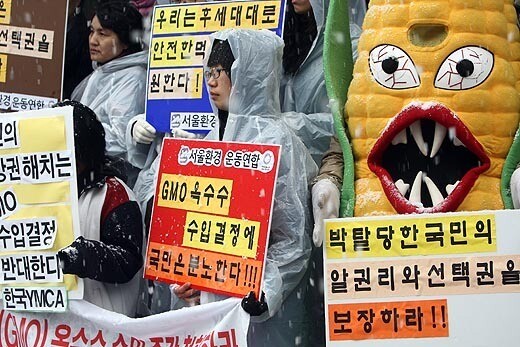hankyoreh
Links to other country sites 다른 나라 사이트 링크
[Special report part III] More saying that in food, GMO technology is “unhelpful”

Last month, the Hankyoreh acquired findings from a 2014 study of domestic GMO perceptions by the Korea Biosafety Clearing House (KBCH). The results showed 14.5% of respondents describing GM technology as “unhelpful,” up from 13.8% in 2013. More than half of this group (51.7%) cited “fears about physical safety” as their reason, an increase of 13.1 percentage points from the 38.6% who gave the same response the year before. Meanwhile, 48.2% of respondents agreed that GM technology was “helpful” - a similar percentage to 2013, and down 4.6% from 2012. KBCH, which organizes government education and publicity campaigns on GMO, has conducted yearly surveys on GMO perceptions; the latest one interviewed 600 adults nationwide aged 19 and over between Nov. 6 and 28.
Perhaps a more striking trend had to do with attitudes on the use of GM technology. Around 80% of respondents agreed the technology could be used in areas such as healthcare/pharmaceuticals (85.3%), bioenergy (81.7%), and environmental purification (79.7%). Few, in contrast, agreed with its use in food/agricultural (40.8%) or livestock (31.3%). The findings suggest that the public is okay with the use of GM in industry areas like medicine, but doesn’t want it to reach the food on their kitchen tables.
“Looking at attitudes on GMO commercialization, you see that people are relatively motivated to purchase GMO products in industry areas like bioenergy or healthcare and pharmaceuticals, but they’re less interested in buying GMO products in food, agricultural, or livestock, such as fast-growing GM salmon and swine,” explained KBCH.
While the administration and industry claim they are respectively enacting and following strict standards on GM food management, the public is looking for stronger regulations on GMO. Since 2012, between 86% and 89% of survey respondents have answered “yes” when asked if the use of GMO ingredients in products sold on the market should be subject to mandatory labeling. Demand for regulation was particularly high among respondents in their forties (91.4%) and respondents who reported having an “interest in GMOs” (97.4%).
Despite the deep-seated distrust in the GMO management system, the administration maintains that there are no issues with before- or after-the-fact safety management for GM foods. A document on GM food safety management published in late June 2014 by the MFDS declared that “the presence of GM foods and compliance with the labeling system are verified at the import stage to manage GM food safety, and collection, testing, guidance, and reviews are conducted for the agricultural products and processed foods that are in circulation.”
Nam Yoon In-soon, a New Politics Alliance for Democracy lawmaker on the National Assembly’s Health and Welfare Community, received a report from the MFDS on Jan. 11 examining GMO food labeling control over the past five years. The figures showed a total of 22,986 episodes of government control measures in the period between 2010 and Sept. 2014. The number of violations totaled just eleven. Most of the false GMO food labeling cases discovered involved small-scale bean flour manufacturing operations.
By Choi Sung-jin, staff reporter
Please direct questions or comments to [english@hani.co.kr]

Editorial・opinion
![[Column] Has Korea, too, crossed the Rubicon on China? [Column] Has Korea, too, crossed the Rubicon on China?](https://flexible.img.hani.co.kr/flexible/normal/500/300/imgdb/original/2024/0419/9317135153409185.jpg) [Column] Has Korea, too, crossed the Rubicon on China?
[Column] Has Korea, too, crossed the Rubicon on China?![[Correspondent’s column] In Japan’s alliance with US, echoes of its past alliances with UK [Correspondent’s column] In Japan’s alliance with US, echoes of its past alliances with UK](https://flexible.img.hani.co.kr/flexible/normal/500/300/imgdb/original/2024/0419/2317135166563519.jpg) [Correspondent’s column] In Japan’s alliance with US, echoes of its past alliances with UK
[Correspondent’s column] In Japan’s alliance with US, echoes of its past alliances with UK- [Editorial] Does Yoon think the Korean public is wrong?
- [Editorial] As it bolsters its alliance with US, Japan must be accountable for past
- [Guest essay] Amending the Constitution is Yoon’s key to leaving office in public’s good graces
- [Editorial] 10 years on, lessons of Sewol tragedy must never be forgotten
- [Column] A death blow to Korea’s prosecutor politics
- [Correspondent’s column] The US and the end of Japanese pacifism
- [Guest essay] How Korea turned its trainee doctors into monsters
- [Guest essay] As someone who helped forge Seoul-Moscow ties, their status today troubles me
Most viewed articles
- 1[Column] The clock is ticking for Korea’s first lady
- 2Samsung barricades office as unionized workers strike for better conditions
- 3After 2 months of delayed, denied medical care, Koreans worry worst may be yet to come
- 4[Correspondent’s column] In Japan’s alliance with US, echoes of its past alliances with UK
- 5[Column] Has Korea, too, crossed the Rubicon on China?
- 6Hong Se-hwa, voice for tolerance whose memoir of exile touched a chord, dies at 76
- 7All eyes on Xiaomi after it pulls off EV that Apple couldn’t
- 8US overtakes China as Korea’s top export market, prompting trade sanction jitters
- 9[Photo] Smile ambassador, you’re on camera
- 10[Guest essay] How Korea turned its trainee doctors into monsters